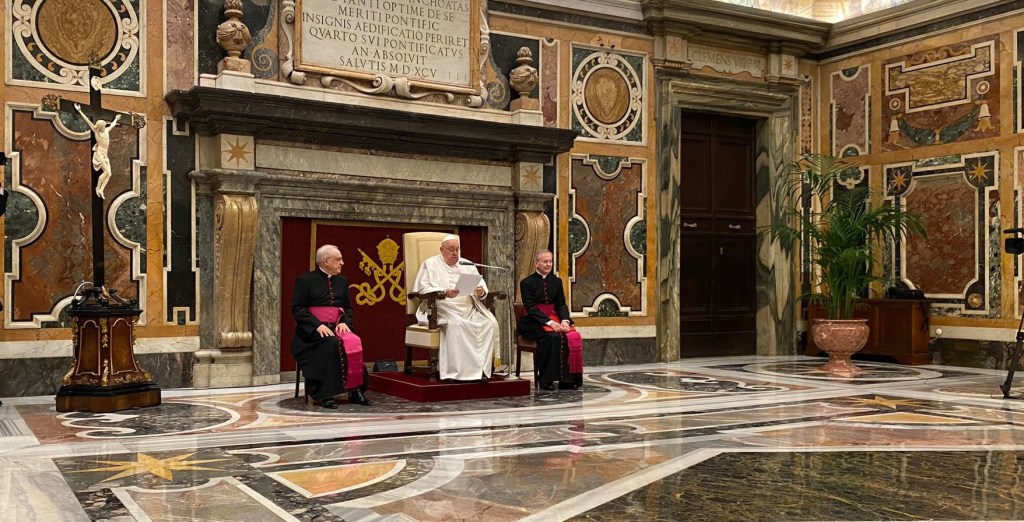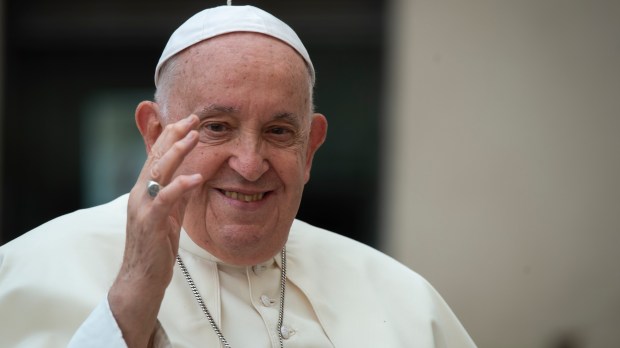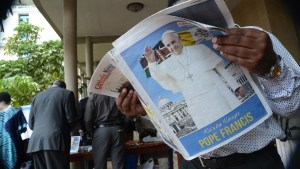Pope Francis thanked journalists for their work, saying that their mission to bring the truth to humanity is a vocational work, in the same way that the careers of doctors are also vocations.
The Holy Father received 140 journalists who report on the Holy See at the Vatican on January 22, 2024. During the audience, which I.Media attended, the Pope in particular urged the press corps not to hide the Church’s “miseries” but also not to make “unnecessary noise” that strays into gossip.
Moving away from his prepared speech and improvising, Pope Francis highlighted “the delicacy that [the journalists] so often have in speaking of scandals in the Church.”
“There are some [scandals] and many times I have seen in you a great delicacy, a respect, an almost, I say, ‘abashed’ silence: thank you for this attitude,” he said.

The journalists who attended the meeting are members of the International Association of Journalists Accredited to the Vatican (AIGAV), meaning accredited to the Holy See Press Office. AIGAV brings together 130 Catholic and non-Catholic media outlets, which cover the news concerning the Pontiff and the Church on a daily basis, and also accompany him on his international travels.
The Pope’s “travelling companions”
“Welcome, even though you are at home here!,” the Pontiff said to the journalists after entering the frescoed Clementine Hall. “I am pleased: This is for me an opportunity to thank you, who are a bit like my traveling companions, for the work you carry out in informing readers, listeners, and viewers.”
Francis then said that “being a journalist is a vocation, somewhat like that of a doctor.” As a doctor “chooses to love humanity by curing illnesses” a journalist “does likewise, choosing to touch personally the wounds of society and the world,” he explained. He urged the reporters to “cultivate an unconditional love of truth.”
The Pope apologizes for taking journalists away from their families
“I would like to express gratitude […] for your constancy and patience in following day after day the news that arrives from the Holy See and the Church,” the Pope continued, acknowledging the “sacrifices” that come with reporting on the Successor of Peter, such as “working often even on Sundays and feast days.”
“I apologize for the times when the news concerning me in various ways has taken you away from your families, from playing with your children […] and from the time to spend with husbands or wives,” the Pope emphasized.
He also said he was happy to “have learned to know you by name,” pointing to some of the journalists who have been covering the Vatican the longest.
“Our meeting is an opportunity to reflect on the tiring job of the vaticanista, […] in recounting the journey of the Church, in building bridges of knowledge and communication instead of rifts of division and distrust,” he added.
Going beyond ideologies and gossip
Quoting a veteran Italian Vatican journalist, Luigi Accattoli, the Pope encouraged information professionals “to love humanity, to learn humility,” despite “the difficulties.” Citing Accattoli again, the Pope highlighted how Vatican journalists have to resist the temptation to “manipulate the image of the Church” through an “ideological” or “spectacular register.”
He thanked the media professionals for their efforts to “not bend to the superficiality of stereotypes and preconceived formulas of the information-spectacle, which, in the difficult search for the truth, prefers the facile categorization of facts and ideas according to pre-established moulds.”
“The beauty of your work around Peter is that of founding it on the solid rock of responsibility in truth, not on the fragile sands of gossip and ideological interpretations; that lies in not hiding reality and its miseries, not sugarcoating the tensions but at the same time not making unnecessary noise, rather striving to capture the essential, in the light of the nature of the Church,” the Pope concluded.
“How much good this does to the People of God, to the simplest people, to the Church herself, who still has some way to go to communicate better: with witness, before words.”


